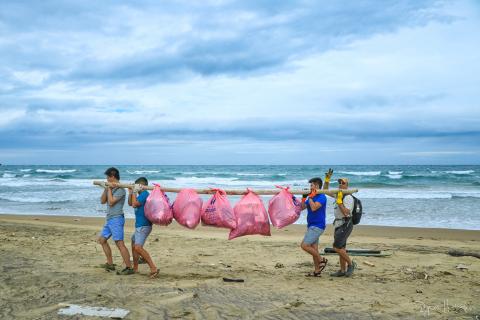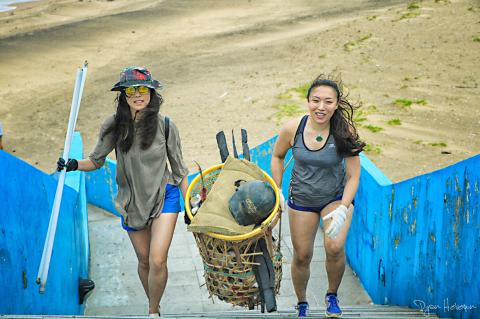With the big heat of summer just around the corner, the mass weekend exodus to the beaches of northern Taiwan is once again fast approaching. Since three or four of Taiwan’s finest are just an hour or so from the capital, a day beside the sea is a popular choice for Taipei residents.
Sadly however, all is not well on northern Taiwan’s beaches. Carelessly dropped trash continues to be a problem, greatly magnified by a huge volume of garbage swept in from overseas on the incoming tide. The good news is that there are many people, both Taiwanese and foreign residents, who are determined to do something about it. Among them are Ryan Hevern and Dustin Craft, the two American guys behind Taiwan Adventure Outings (TAO), an outfit they founded in late 2015.
Hevern says TAO was set up “as a means to get outdoors ourselves, to explore new places in Taiwan and to meet new people who had the same drive to be adventurous.”

Photo courtesy of Ryan Hevern
Hevern says the outfit wanted to give something back to the community and the environment by hosting monthly beach and forest cleanups, as well as connecting travelers with small-scale local tourism initiatives that would expose people to the nation’s beauty, culture and adventures, as well as providing opportunities to contribute towards maintaining these beautiful locations.”
Hevern and Craft organized an initiative on May 20 called Taiwan National Clean Up Day, their biggest and most ambitious cleanup operation to date, involving a total of 10 groups working to clear trash from parts of Taipei City and Yilan County.
The majority of the sites targeted were popular beaches, but four of the groups worked to clear trails in the area around New Taipei City’s Pingsi District (平溪), where fallen sky lanterns continue to mar the landscape despite local efforts to retrieve them.

Photo courtesy of Ryan Hevern
Hevern says that beach clean-ups can be potentially dangerous.
“Unfortunately, we find hypodermic needles every clean up.” Hevern says. “One time in Shalun Beach in Tamsui we found 37 of them in the sand.”
It’s hard and potentially risky work cleaning up Taiwan’s beaches and mountains, but the efforts of the volunteers didn’t go unappreciated last weekend. According to Jan Willem Overmars, one of the volunteers, “Drivers and passengers were encouraging our cleanup: cheering, clapping, [and giving us a] thumbs up. This kept us going.”
Hevern says anyone can play a part in improving the local environment.
“Everyone on a hike or outdoor adventure can take back garbage they find. Beyond this we can also take steps to reduce our consumption of plastic. Bring your own chopsticks and spoons, metal straw and thermos [when you go out to eat]. Resist using a plastic bag when you buy something in a shop.”
To sign up for future TAO cleanups, head to their Facebook group at www.facebook.com/groups/505284866320444

On April 26, The Lancet published a letter from two doctors at Taichung-based China Medical University Hospital (CMUH) warning that “Taiwan’s Health Care System is on the Brink of Collapse.” The authors said that “Years of policy inaction and mismanagement of resources have led to the National Health Insurance system operating under unsustainable conditions.” The pushback was immediate. Errors in the paper were quickly identified and publicized, to discredit the authors (the hospital apologized). CNA reported that CMUH said the letter described Taiwan in 2021 as having 62 nurses per 10,000 people, when the correct number was 78 nurses per 10,000

As we live longer, our risk of cognitive impairment is increasing. How can we delay the onset of symptoms? Do we have to give up every indulgence or can small changes make a difference? We asked neurologists for tips on how to keep our brains healthy for life. TAKE CARE OF YOUR HEALTH “All of the sensible things that apply to bodily health apply to brain health,” says Suzanne O’Sullivan, a consultant in neurology at the National Hospital for Neurology and Neurosurgery in London, and the author of The Age of Diagnosis. “When you’re 20, you can get away with absolute

May 5 to May 11 What started out as friction between Taiwanese students at Taichung First High School and a Japanese head cook escalated dramatically over the first two weeks of May 1927. It began on April 30 when the cook’s wife knew that lotus starch used in that night’s dinner had rat feces in it, but failed to inform staff until the meal was already prepared. The students believed that her silence was intentional, and filed a complaint. The school’s Japanese administrators sided with the cook’s family, dismissing the students as troublemakers and clamping down on their freedoms — with

As Donald Trump’s executive order in March led to the shuttering of Voice of America (VOA) — the global broadcaster whose roots date back to the fight against Nazi propaganda — he quickly attracted support from figures not used to aligning themselves with any US administration. Trump had ordered the US Agency for Global Media, the federal agency that funds VOA and other groups promoting independent journalism overseas, to be “eliminated to the maximum extent consistent with applicable law.” The decision suddenly halted programming in 49 languages to more than 425 million people. In Moscow, Margarita Simonyan, the hardline editor-in-chief of the